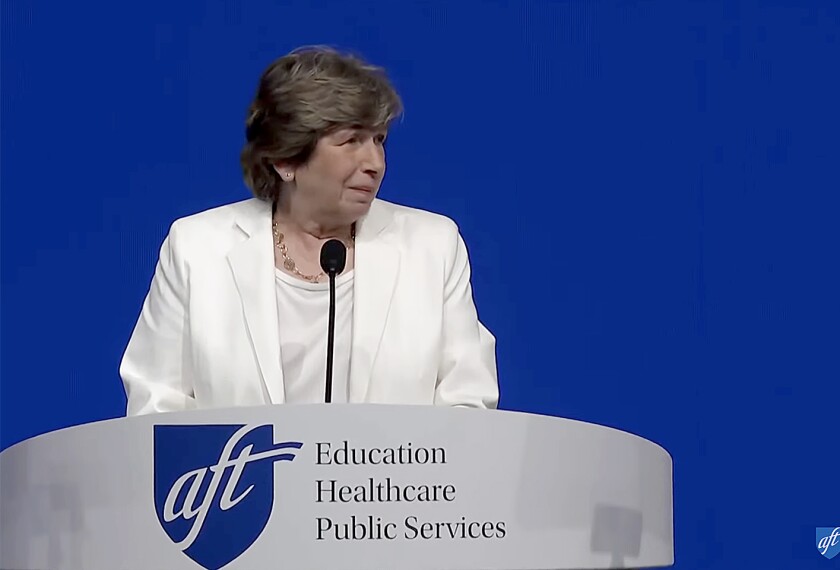Even as school districts across the country clamor for flexibility under the No Child Left Behind Act, state education chiefs have a clear message for U.S. Secretary of Education Secretary Arne Duncan: Any decision to seek a federal waiver should rest with them, not individual districts.
That message, delivered last week to Mr. Duncan at a meeting of the Council of Chief State School Officers, comes as the U.S. Department of Education is considering offering waivers to individual school districts in states that choose not to seek formal flexibility on many of the key provisions of the NCLB law.
Virginia Superintendent of Public Instruction Patricia I. Wright told the education secretary during a March 26 hourlong question-and-answer session that such a move would “undermine states.” Colorado schools Commissioner Robert Hammond said it would “bypass” state authority and result in “unintended consequences.”
Mr. Duncan avoided getting into specifics about any district-level waiver plans. He said only that after the Sept. 6 third-round deadline for waiver applications, “we’ll look at where we are at that point.”
Those waivers would be aimed at districts in states that do not apply for formal flexibility by the third-round deadline. States that seem unlikely to apply include California and Texas, which together have nearly 2,000 districts.
Already, 11 states have won waivers, and 27 more applications are under consideration. The Education Department is expecting five more states to apply in September.
In exchange for a waiver of requirements that schools progress toward 100 percent student proficiency by the end of the 2013-14 school year and provide tutoring and school choice in failing schools, states had to adopt standards for college and career readiness and guidelines for incorporating student performance into teacher evaluations, among other measures.
Many of the requirements would have to be adapted for a district-level process, since decisions such as setting academic standards or deciding what subjects to test are made at the state level.
And for those reasons, said Debbie Ratcliffe, the spokeswoman for the Texas Education Agency, “we think it would be hard for an individual Texas district to meet the requirements.”
“We are still weighing options at the state level,” she said.
The waivers are intended to give states flexibility to redesign their accountability systems and offer freedom from the 2014 deadline, as more and more schools fail to meet the law’s yardstick of “adequate yearly progress” toward that goal, thus triggering sanctions. The breathing room comes as Congress is years overdue in rewriting the Elementary and Secondary Education Act, whose current version is the NCLB law.
Targeted Flexibility
Until recently, federal officials had never broached the idea publicly that an alternative waiver process might exist just for districts. Last year, Education Department officials even made a point to convey that there would be no “plan C.”
“If Congress needs more time [to reauthorize], our plan B would be to offer relief in exchange for reform to states who desperately want flexibility from NCLB’s broken provisions,” department spokesman Justin Hamilton said in July. “This will give all states the option of either complying with existing law or participating in plan B. One way or another, we need to enforce the law or change it.”
Individual districts may not want—or even need—all the flexibility being offered to states.
For Terry B. Grier, Houston’s superintendent, simply freeing up approximately $22 million a year the district spends on tutoring—one consequence for schools not making adequate yearly progress under the NCLB law—would be meaningful enough on its own. “We have absolutely no intention to apply for a [broad] waiver from testing or accountability. We believe in that,” said Mr. Grier, whose district enrolls about 200,000 students, 80 percent of whom qualify for free or reduced-price lunch.
Even if the state education agency discourages Texas districts from applying, Mr. Grier said he wouldn’t be dissuaded. If Secretary Duncan makes an offer to districts, he said, “we’re applying.”
“We quite frankly believe that our board of education is in the best position to make those kinds of decisions,” he said. And with all due respect to the Texas Education Agency, he added, “we don’t think we should be shackled by state departments of public instruction.”
Noelle Ellerson, the assistant director for policy analysis and advocacy for the American Association of School Administrators, said she’s confident that the federal department is serious when it talks about a district waiver option. She said she could see districts encouraged to apply in groups—or through education service agencies—so as to not flood the department with thousands of waiver applications.
“A district should not be precluded from this flexibility simply because the state lacked the personnel, political, or fiscal capacity to handle waivers—or whether they decided for political reasons not to engage with the federal department,” Ms. Ellerson said.
Who’s Accountable?
For its part, the CCSSO is opposed to district waivers unless they are pursued in cooperation with a state, said Gene Wilhoit, the executive director of the state chiefs’ group.
Ron Tomalis, Pennsylvania’s secretary of education, pointed out that school districts are creations of state government and are financed—for the most part—by states.
In an interview, he said: “To allow districts to go directly to the feds to get waivers, ... it would be difficult to see who is exactly responsible for accountability and reforms in their states.”




